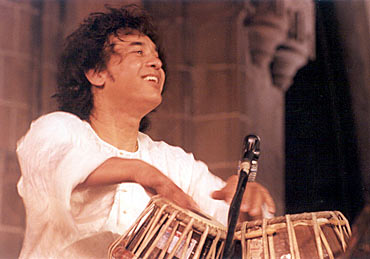
One of the hottest tickets in New York this week is for Ustad Zakir Hussain's Masters of Percussion.
On March 12 and 13, the tabla maestro will get together with some of the best in Indian classical and folk music to drum up a storm.
Hussain will be joined by percussionists Taufiq Qureshi, Navin Sharma, Sridar Parthasarathy, the Motilal Dhakis from Bengal, sarangi player Sabir Khan and the violin duo of Ganesh and Kumaresh at the event organised by World Music Institute.
The ustad speaks to Arthur J Pais...
You have been touring with percussionists from all over India for many years. How did this idea come to you?
This project was started with my father Ustad Allah Rakha Khan's blessings in 1996. He felt that the many kinds of percussionists across the country needed to be made known to music lovers across India, and if possible, across the world.
Most people only know of the popular Indian percussion instruments like the tabla and dholak. But many Indian states have a wonderful tradition of music, using a variety of instruments.
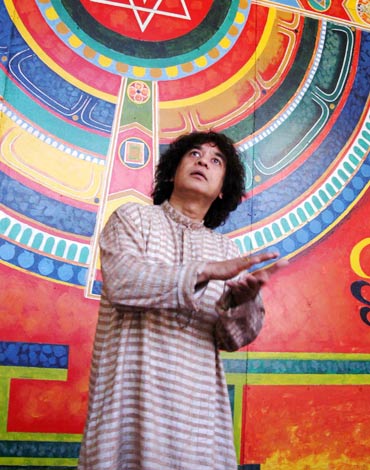
How do find these musicians?
I spend a considerable amount of time in India. And since I have been doing this for many years, I get to hear of brilliant musicians.
How do you prepare them for a world tour?
I get them to perform with me in various Indian cities, and when they are comfortable with performing before a large audience, I bring them to America. We travel to over a dozen cities.
You have brought some interesting musicians on this tour too?
Yes. For instance, the Dhakis from Bengal. They are famous for their performances during Durga puja in Bengal. They tie the colourful drums to their bodies and perform while dancing.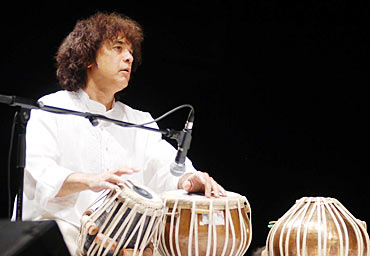
You had once brought Manipuri percussionists who perform in a similar fashion...
Yes, they too tie the drum to their bodies and leap into the air now and then when they perform. But the dhakis are like polished diamonds and the Manipuri dancers the rough diamonds.
You have said that in the last two decades or so, percussionists have been getting due recognition from organisers and the public in India.
True. When I was starting out, percussionists mostly traveled by train, while the singers and instrumentalists were given air tickets. But now we get quite a bit of attention and good treatment. Even then, there are many unsung percussionists around me. In fact, that is one of the reasons why I took my father's suggestion seriously.
Which development, do you think, conveys the best picture of this changing scenario for percussionists?
Now when people go to a concert featuring someone like Pt Ravi Shankarji, they also want to know who is playing the tabla. The singers and vocalists are also giving us due respect.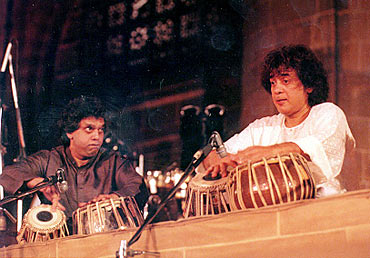
In many ways it was your father who brought about a change in the way percussionists were viewed.
True, but Allah Rakha alone cannot bring about a profound change. There have been many other percussionists who have worked very hard to make their work known and appreciated.
On the subject of your father, anyone who has seen his picture or seen him perform knows how much he enjoyed performing. It showed on his face. The same seems true for you. Are we right in believing that?
[Chuckles]. Life is full of miseries. There are always personal and professional problems. If I truly don't enjoy something, how can I do justice to my work?
You have worked and performed with a number of inspiring musicians from across the globe. Yet you make time to encourage new talent.
There is a lot of joy and satisfaction in grooming people. In the upcoming concert, I am playing with Sabir Khan. Usually, sarangi maestro Ustad Sultan Khan would be playing with me, but he is not well. He asked me to take his son, instead.
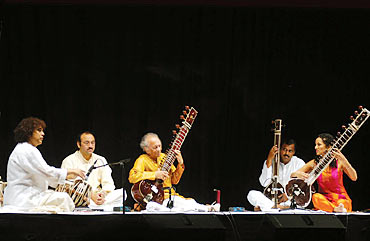
You never fail to pay respect to your father in your interviews. What is the best life lesson that you have taken from him?
Whatever I am today, it is due to the encouragement, inspiration and life lessons I learnt from my father. I learned the importance of loving my work and humility from him. He had said, 'Don't try to be a leader, be a good student.'
And that means?
Every time I step out of the door, I learn something new. Every time I listen to a recording, I learn something. Life continues to be an unending learning process.